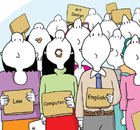Global General
Sarkozy insists on carbon tariff on EU borders
(Xinhua)
Updated: 2010-01-07 14:55
 |
Large Medium Small |
PARIS: French President Nicolas Sarkozy said on Wednesday that a carbon tariff on European Union borders was necessary to balance international trade for French enterprises.
"I will fight for a carbon tax levied on EU borders," Sarkozy announced when addressing local business leaders in Cholet, western France.
Sarkozy said that it was unfair to impose carbon tax on French enterprises while letting other countries neglecting their environmental responsibilities.
| ||||
The council said the bill contains too many exemptions. More than 1,000 of the country's top polluters would have been able to dodge the tax, it said.
The first law stipulates a tax of 17 euros ($25) per ton of carbon dioxide emissions on oil, gas and coal consumption.
The French cabinet is expected to come up with a renewed version of carbon tax bill on January 20 and Sarkozy said Tuesday that he would like to see the revised bill to take effect on July 1.
Polls showed the tax was opposed by roughly 70 percent French citizens. Opposition Socialist and Green parties welcomed the Constitutional Council ruling, saying it would prompt the government to rethink its environment policies.
The carbon tariff on EU borders promoted by Sarkozy is not so much welcomed by its EU neighbors either. Participants of an EU environmental ministerial meeting last July have voiced opposition to the proposal.
A carbon tariff would be a new form of "ecological imperialism, " and it would send out a wrong signal, said a German representative to the gathering.
Meanwhile, many developing nations believe the tariff, which was no difference to another trade barrier, would further threaten world trade equality.








